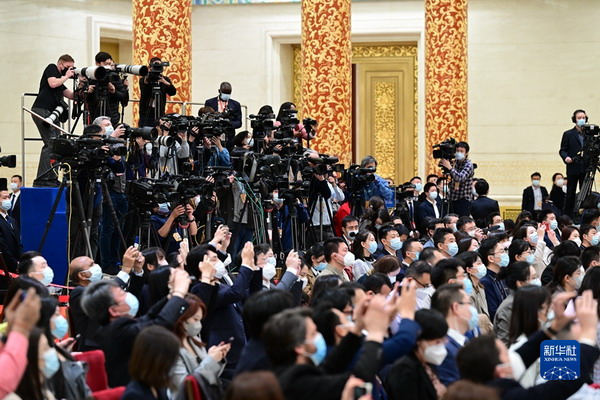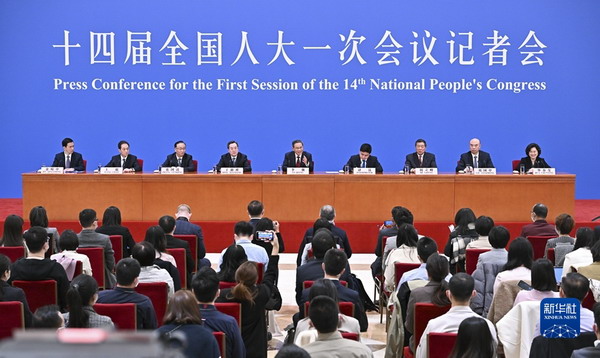
The First Session of the 14th National People’s Congress held a press conference at the Great Hall of the People on the morning of March 13, 2023. Premier of the State Council Li Qiang met with Chinese and foreign reporters and answered their questions at the invitation of Spokesperson Mr. Wang Chao. Vice Premiers of the State Council Ding Xuexiang, He Lifeng, Zhang Guoqing and Liu Guozhong were present at the press conference.
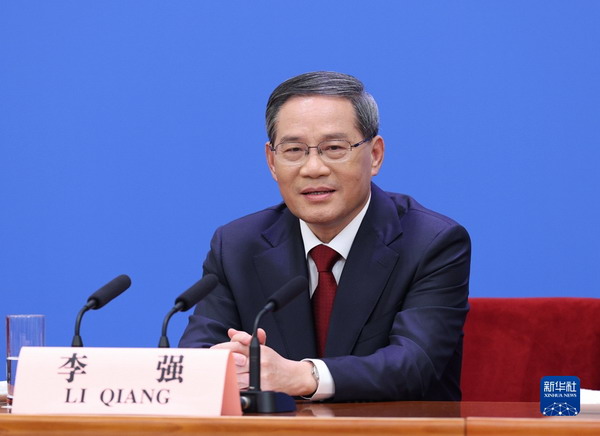
In his opening remarks, Premier Li Qiang said that he was delighted to meet friends from the media and thanked the journalists for their hard work in covering China’s NPC and CPPCC sessions. On behalf of himself and the Vice Premiers, he thanked the Party and the people for their trust and noted that they are deeply aware of the important responsibilities and glorious mission upon their shoulders. He underscored that they will follow the strong leadership of the CPC Central Committee with Comrade Xi Jinping at its core, rely closely on the people, and faithfully perform the duties entrusted by the Constitution and laws with an enterprising spirit and a strong sense of responsibility. He said they will press ahead with grit, stay honest and upright, exert their utmost and live up to their mission.
China Central Television: First of all, congratulations to you, Mr. Premier, and the four Vice Premiers. The coming five years will be crucial for getting the efforts to build a modern socialist country in all respects off to a good start. People both at home and abroad are following closely the work of the new government. My question is, what are the goals and priorities of the new government? How will the government carry out its work?
Premier Li: Thank you for your congratulations, and I also want to thank you for your interest in the work of the government.
The 20th National Congress of the Communist Party of China held last October laid out a comprehensive and strategic plan for the country’s development in the next five years and beyond. Regarding the important issues that are of interest to the people, the 20th Party Congress report has provided clear answers.
The task of the new government is to implement and deliver on the important decisions and plans laid out by the Party Central Committee, turn the inspiring blueprint drawn up at the 20th Party Congress into an implementation scheme, and work with our people to step by step turn this blueprint into a beautiful reality.
In carrying out our work, we will focus on the following priorities:
First, we will firmly follow a people-centered development approach. The ultimate aim of the work of the Party and the government is to improve the well-being of the people. As General Secretary Xi Jinping pointed out, people’s aspiration for a better life is our goal. We will always bear in mind that ours is a people’s government, and we will make solid efforts on every piece of work concerning people’s livelihood.
Honestly speaking, most people do not keep their eyes on GDP growth all the time. What they care more about are the things that happen in their everyday life, like housing, employment, income, education, medical services and the environment. Therefore, the government must always plan and carry out its work according to the people’s wish.
Second, we will focus our efforts on promoting high-quality development. You may have noticed that when attending the deliberations by the NPC deputies from Jiangsu Province during the two sessions, General Secretary Xi Jinping stressed the importance of focusing on the top priority of high-quality development. Indeed, China has made great progress in economic and social development. We are now the second largest economy in the world. This said, China’s development is still unbalanced and inadequate. Any aggregate volume, when divided by the 1.4 billion population, will become a small per capita figure.
Currently, our development is focused on providing for people’s basic needs. Going forward, the focus will be shifted toward delivering a life of better quality for the people. In particular, we will enhance our capacity for scientific and technological innovation, build a modern industrial system, and transition toward green development.
All in all, we will make greater efforts to fully and faithfully apply the new development philosophy on all fronts, move faster to create a new development paradigm and concentrate on promoting high-quality development.
Third, we will remain steadfast in deepening reform and opening-up. As we often say, reform and opening-up is a crucial move that has made China what it is today. In the historical process of advancing Chinese modernization and realizing the second centenary goal, we must continue to firmly pursue the path of reform and opening-up. We will keep to the direction of socialist market economy reform, promote high-level opening-up, and inject stronger vitality into China’s development by deepening reform.
CNBC: Premier Li, this year marks the first since the peak of COVID in China, and many expect the economy to rebound in the near term. What policies will China enact to achieve its full-year growth target? What drivers of growth and drags on the economy does China expect in the year ahead and in the next five years? What kind of policies does China plan to pursue in the next five years to support sustainable, high-quality growth? Finally, how effective have policies been in the last few years in reducing debt, disorderly expansion of capital and other systemic risks in China?
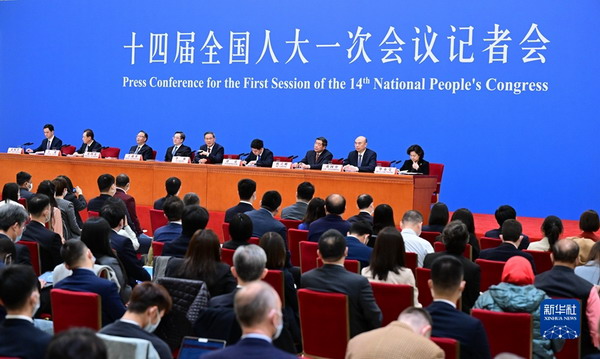
Premier Li: You have really made the most of this opportunity. I counted four questions on six subjects. Due to time limit, let me answer your questions briefly.
The prospect of the global economy this year is indeed not optimistic. We see many factors of uncertainty and instability, and unpredictable factors. Stabilizing economic growth is a challenging task for all countries in the world. This year, we have set the GDP growth target at around five percent, which is based on consideration of various factors. Currently, China’s total economic output has already exceeded 120 trillion RMB yuan, a very high base figure. We also face quite a number of new challenges this year. To achieve around five percent growth on such a high base figure is not an easy task, and it would require redoubled efforts.
As for the specific economic policies, the Central Economic Work Conference last year already laid out a comprehensive plan. Basically, we will keep to the general principles of prioritizing stability and seeking progress while maintaining stability, and push for a turnaround in overall economic performance. On stability, the emphasis will be placed on ensuring stable growth, stable jobs and stable prices. On progress, the key will be making new progress on high-quality development.
As for our specific work going forward, we will introduce a number of policy combinations as follows: a combination of macro policies, a combination of policies for expanding demand, a combination of policies for advancing reform and innovation, and a combination of policies for preventing and defusing risks. These policy combinations will all be supported by concrete implementing steps. We will enrich, adjust and improve these policy combinations in the course of implementation.
The journalist also asked about the drivers of and drags on the Chinese economy. Indeed, China’s economic development has quite a number of advantages. For example, we have a super-sized market, a well-functioning industrial system, rich supply of human resources and a strong development foundation. More importantly, we have notable institutional strength.
Talking about difficulties, I think all countries are confronted with some difficulties, and we see no less difficulty for China this year. But think about it. Is there any single period or any single year where we had no difficulty at all? The Chinese people have always pulled through difficult times and achieved new progress. People of my generation are familiar with such Chinese fabled stories, like Da Yu taming the floods, Yu Gong moving the mountains, Jing Wei filling the ocean with pebbles, and Kua Fu chasing after the sun. These inspiring stories are testament to the spirit of resilience, tenacity and perseverance that has defined the Chinese nation. We, the Chinese people, have never been crushed by any difficulty.
As the economic performance in the first two months of this year demonstrates, the Chinese economy is stabilizing and picking up. Some international organizations have revised upward their projections for China’s economic growth this year. To sum up, I believe the Chinese economy will break winds and waves, and sail toward a brighter future. I have full confidence in that.
Phoenix TV: In recent years, Hong Kong has restored order and stability, marking a major turnaround in the situation. Now development in Hong Kong has captured the attention of many. But due to changes in international political and economic landscapes, some believe that the international competitiveness of Hong Kong and Macao is weakening. What is your assessment of the future prospects of Hong Kong and Macao, and how will the central government support Hong Kong and Macao in leveraging their strengths and unique features, and achieve better development?
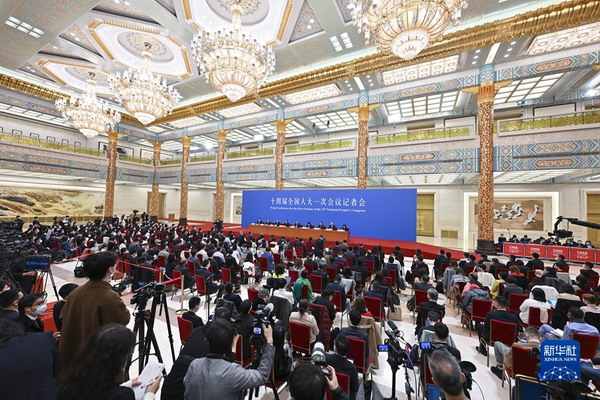
Premier Li: The central government has all along attached high importance to helping Hong Kong and Macao leverage their unique strengths and features. Since the return of Hong Kong and Macao to the motherland, with the support of the country, Hong Kong’s position as a global financial, trading and shipping center has been consolidated and elevated. Macao has also built itself into a world-renowned tourism and leisure center.
In recent years, due to various factors, both Hong Kong and Macao have experienced some difficulties in their economic development. But I believe these are temporary difficulties that have arisen in the course of development. The central government will fully, faithfully and resolutely implement the policy of One Country, Two Systems. We will give full support to Hong Kong and Macao in integrating into the country’s overall development. We will give full support to the two regions in growing their economy and improving people’s livelihood. We will give full support to the two regions in further building their global competitiveness. I am confident that with the strong backing of the motherland and the institutional safeguards of the One Country, Two Systems policy, the standing and role of Hong Kong and Macao will only strengthen, not weaken. Hong Kong and Macao will enjoy an even brighter future.
Lianhe Zaobao: Mr. Premier, you worked as the Party Secretary of Wenzhou in your earlier career. Both Wenzhou and other places you later worked in, Zhejiang, Jiangsu and Shanghai, all have an advanced private economy. We know that you have a keen insight on the private economy. In your view, what additional measures need to be taken to boost the confidence of private companies and support their development? What are the areas where further efforts are needed?
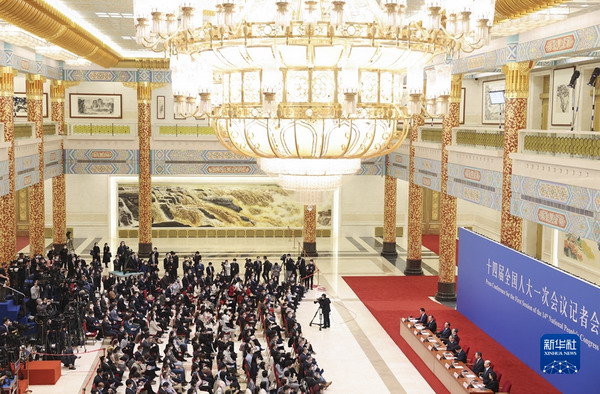
Premier Li: You may have noted that when meeting with the CPPCC National Committee members during the two sessions, General Secretary Xi Jinping elaborated on the importance of ensuring healthy and high quality development of the private sector. General Secretary Xi’s words were very well-received, and made private entrepreneurs feel both motivated and encouraged.
I worked in localities with a strong private economy for a long time, and had the opportunity to talk with local entrepreneurs on many occasions. I could say I am pretty well-informed of their aspirations and difficulties in their development. I want to take this opportunity to mainly convey the following messages.
First, the policy of “two unswervinglys”, namely unswervingly consolidating and developing the public sector and unswervingly encouraging, supporting and guiding the development of the non-public sector, is an important component of China’s basic economic system. This is a long-term policy that did not change in the past and will not change in the future. Indeed, there were some incorrect discussions about private entrepreneurs last year, which made them feel concerned. As a matter of fact, the Party Central Committee has clear policies and principles regarding the development of the private sector. Both the 19th and the 20th national congresses and the Central Economic Work Conference last year reaffirmed these policies and principles. Our commitment in this regard is unequivocal and steadfast.
The second point I want to make is that private enterprises will enjoy a better environment and broader space for development. Standing at a new starting point, this government will continue to foster a market-oriented and law-based business environment in keeping with international standards, treat companies under all types of ownership as equals, protect the property rights of enterprises and the rights and interests of entrepreneurs in accordance with law. We will create a level playing field for all kinds of market entities and make further efforts to support private enterprises to grow and thrive. As for development space, China has a super-sized market with huge demand. There are a lot of new sectors and new racing tracks that can be tapped. All this promises great opportunities for private entrepreneurs.
Third, the new era inspires private entrepreneurs to write new entrepreneurship stories. This is a point I particularly want to make on this occasion. Economic development follows certain economic laws and depends on the conditions available. However, it is even more important to bring out people’s initiative. So I do hope that private entrepreneurs will carry forward the entrepreneurial spirit and strengthen confidence as they start their new journey. Talking about this, I remember that when Zhejiang Province and Jiangsu Province were developing the private sector and township enterprises, the local entrepreneurs cultivated a strong pioneering spirit. To reach their goals, they were willing to explore all paths, go through all troubles, try all means and endure all hardships. Although the models and forms of entrepreneurship are vastly different today, this kind of pioneering spirit of clearing obstacles and blazing new trails will always be needed. Government officials at all levels must sincerely care for and support the development of private enterprises, build clean and cordial relations with private entrepreneurs and take the lead in promoting a culture of respect for pioneers and entrepreneurs. I am confident that in the new era and on their new journey, our private entrepreneurs will continue to write their exciting entrepreneurship stories.
The Paper: The netizens are all following closely issues concerning their livelihood. This year, the employment situation remains serious in China. What steps will the government take to stabilize employment? Last year, China’s population experienced negative growth for the first time in decades. Does that mean China’s demographic dividend is disappearing and will the government introduce the policy of postponed retirement this year?
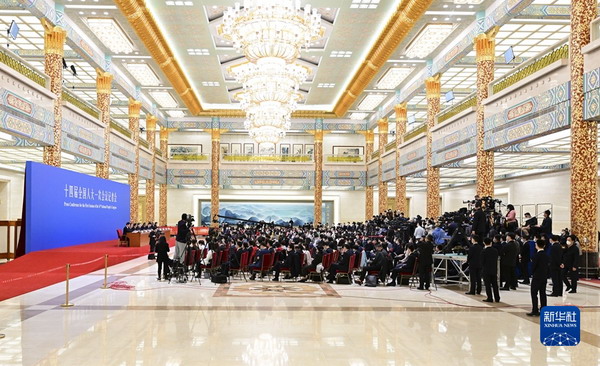
Premier Li: I’m happy to answer questions raised by the netizens. When I have time, I also go online quite a lot to see what the netizens are thinking and what suggestions they have for the work of the government.
You actually asked three questions.The first question is on employment. Employment is the cornerstone of people’s livelihood. Ultimately, the solution to job creation lies in economic growth. As for the specific steps going forward, we will continue to pursue the employment-first strategy. We will increase government support in terms of employment services and technical training. We will take multiple steps to stabilize and expand employment. We will support and regulate the development of new forms of employment. This year, we expect to see 11.58 million college graduates entering the workforce. This large number certainly adds pressure to employment, but if we look at it from a development perspective, these young people can inject energy and vitality into our society. Going forward, we will further expand channels of employment. In particular, we will help young people realize their personal value through hard work.
Your second question concerns population growth. With negative population growth in China, some people are worried that China’s demographic dividend may be disappearing. But I don’t think it is that simple. When assessing demographic dividend, we should look at not just the quantity but also the quality of population. We should not just look at the sheer size of the population, but also look at the scale of high-caliber workforce. Now we have a close to 900 million working-age population, and every year more than 15 million people join the workforce. A rich supply of human resources remains China’s notable strength. More importantly, we have more than 240 million people who have received higher education, and the average length of education received by new entrants into the workforce has increased to 14 years. Therefore, China’s demographic dividend has not disappeared, and our talent dividend is in the making. The driving force for China’s development remains strong. That said, we will conduct careful study on the problems that may be brought by the changes in population and respond with appropriate steps.
Your third question concerns the policy of postponed retirement. We will conduct careful studies and thorough analysis to roll out the policy prudently in due course.
Narodnoe Slovo of Uzbekistan: China kept strict COVID measures in place for over two years. As some people in the world have questioned, were those measures truly necessary? And what preparation has China made for a potential new wave of COVID?
Premier Li: For over three years, under the strong leadership of the Communist Party of China, the Chinese people have made united efforts in fighting COVID-19, and achieved a major and decisive victory in the battle against the disease.
For the past three years, we have always put the people and life above everything else. We have adopted a well-conceived and targeted approach, and adjusted and improved our response measures in light of changing conditions. At the beginning of the pandemic when the virus was highly pathogenic, we resolutely introduced containment measures for class-A infectious diseases. Such efforts helped protect people’s life and health and won us valuable time for the R&D of vaccines and medicines, and for the rolling out of vaccination. At a later stage when the virus became less pathogenic and with the increase in China’s capacity for pandemic control, we improved and adjusted our response measures, made the transition in the response phase in due course, and started to implement measures designed for class-B infectious diseases.
China is a country with a large population and unbalanced development. Yet it only took us less than two months to achieve a smooth transition in COVID response phase and normal economic and social order was restored in a relatively short span of time. This is indeed a remarkable achievement. What has happened proves that China’s COVID strategies and measures are completely right and our COVID response has been highly effective.
Humanity’s battle against the virus is a long-term and historical process. Currently, the risk of virus transmission still exists, so we will make timely assessment of the evolving situation, build up our capacity for early warning and forecast, and make contingency plans for different kinds of scenarios. We will also strengthen the medical and health service systems and speed up the development of new vaccines and drugs. We have also been engaged in coordination and cooperation with the international community to jointly protect the health and well-being of humanity.
United Daily News Group from Taiwan: The mainland says it always cares about, respects and promotes the well-being of compatriots in Taiwan. With the adjustment and improvement of COVID response measures on the mainland, people on both sides of the Strait look forward to the early restoration of normal exchanges. What measures will the mainland take to promote the economic and cultural exchanges and personnel travel across the Strait?
Premier Li: Chinese on both sides of the Taiwan Strait are members of one and the same family. We share an unbreakable bond of blood and kinship. We will continue to promote economic and cultural exchanges and cooperation across the Taiwan Strait on the basis of the one-China principle and the 1992 Consensus. We also encourage more Taiwan compatriots and businesses to come to the mainland. We hope they will not just be willing to come to the mainland, but also be able to integrate into the local communities and achieve better development.
The early restoration of normal exchanges and regular cooperation in various fields between the two sides of the Taiwan Strait is our shared aspiration, and requires our joint efforts.
People’s Daily: In building a modern socialist country in all respects, the most arduous and complex task is still in the rural areas. What plan does this government have in promoting rural revitalization and what measures will be taken to ensure China’s food security?
Premier Li: China is a big country in agriculture. We still have close to 500 million permanent rural residents. Without the modernization of the rural sector and agriculture, socialist modernization would not be complete.
During the Central Rural Work Conference held late last year, General Secretary Xi Jinping made comprehensive instructions on building a strong agriculture, advancing work relating to agriculture, rural development and farmers, and promoting rural revitalization. Our job is to fully deliver on the various tasks in accordance with General Secretary Xi Jinping’s instructions.
In promoting rural revitalization, we will focus on the following three keywords in our work ahead. The first keyword is comprehensive. Rural revitalization is not just about economic growth. In my view, it is also important to fully bring out the economic, ecological, social and cultural value of the countryside. The second keyword is distinctive features. China is a vast country. Cultures and customs vary from village to village, even though they are just miles apart. Different localities must develop their countryside based on local conditions. It is important to cultivate distinctive local features, protect and preserve the local and rural cultures, and avoid a situation where all villages look the same. The third keyword is reform. We need to deepen reform of the rural sector to provide drivers for rural revitalization. Farmers are the principal actors in rural revitalization. We need to fully bring out their initiative and let them take part in reforming the rural sector and better share in the benefits of reform and development.
You also asked a question about food security. The total grain output in China has stayed above 650 million metric tons for eight years in a row. On the whole, food security is well guaranteed in this country. Going forward, we will further increase our grain production capacity by focusing on two key factors, namely arable land and seeds. Here I want to let our farmer friends know that the government’s policy in support of grain production will only increase, not decrease. We encourage our farmers to produce more grain so as to make sure that the rice bowl of the over 1.4 billion Chinese people will always be firmly held in our own hands.
China Arab TV: The world is witnessing more geopolitical frictions and tides of deglobalization. Meanwhile, China-US relations remain under serious strain. Although China has been reassuring the world of its commitment to reform and opening-up, foreign businesses remain worried and some are considering relocation. Will China adjust its opening-up policy? How do you see the current China-US ties? And what are the prospects that the relations might improve?
Premier Li: This year marks the 45th anniversary of the launch of reform and opening-up in China. Reform and opening-up have enabled China to develop itself and also made an impact on the whole world. From what I learned, most foreign companies are still optimistic about their development prospects in China. Last year, China’s utilized foreign investment totaled over US$189 billion, which is again a record high, and almost US$50 billion higher than that of three years ago. This demonstrates that China remains a popular destination for global investment.
Opening-up is a basic state policy for China. No matter how the external situation may evolve, we will stay firmly committed to pursuing this policy. Here I want to mention in particular the China International Import Expo (CIIE). The CIIE is a major step taken by China to open its market to and share its development opportunities with the world. The CIIE has been held uninterruptedly for five years. Even during the pandemic, it was still held as scheduled. Last year there were over 2,800 enterprises from 127 countries and regions attending the Expo. The story of the CIIE proves that an open, big Chinese market promises big opportunities for companies from around the world.
This year we will further expand opening-up in alignment with high-standard international trade rules. China will only open itself wider to the world. We will provide a better environment and better services to all. An open China welcomes investors from all over the world.
As for the specific issues concerning China-US relations, Foreign Minister Qin Gang already elaborated on China’s position during the press conference a few days ago. So I will not go into details. But I want to stress that it is important for us to translate the important consensus reached between President Xi Jinping and President Biden during their meeting last November into actual policies and concrete actions.
I know that in recent years, some in the US have been trumpeting the idea of decoupling from China. And sometimes it could become quite a hot topic on the media. But I wonder how many people can truly benefit from this kind of hype? According to Chinese statistics, last year two-way trade between China and the US reached nearly US$760 billion, which again set a new record in history. China and the US are closely intertwined economically. We have both benefited from the other’s development. For most part of last year, I was working in Shanghai. I had a lot of opportunities to talk with the senior managers of multinational corporations, including many American companies. They all told me that they were optimistic about the future of Shanghai and China, and wished to achieve win-win results through cooperation. All this demonstrates that China and the US can and must cooperate and there are a lot that the two countries can achieve by working together. Encirclement and suppression is in no one’s interest.
Xinhua News Agency: Mr. Premier, the new government faces an arduous and complex task, and also high expectations from the people. This has raised new requirements on the governing capacity and the conduct of the government. What plan does the new government have in terms of strengthening government-building?
Premier Li: The new mission and new task have raised new and higher requirements on us. We will take the new round of state institutional reform as an opportunity to strengthen government-building. We will further transform government functions, make the government’s work more efficient and improve the conduct of the government. Going forward, we will focus on the following four priorities:
First, we will promote the practice of research and studies. The Party Central Committee has already made clear requirements on that, and the State Council must take the lead in meeting these requirements. I have worked in local governments for a long time. My experience is that when you sit in the office, you see lots of problems. But when you reach out to the people, you see all kinds of solutions. After all, the brightest minds are among the people. We will encourage government officials at all levels to engage more with local communities to know about what the people need and seek their opinions on the work of the government. They need to learn from the people and help the people solve their problems. In particular, young people working in government ministries should reach out to the people, keep people’s needs and interests close to their heart, and be down to earth in their work.
The second priority is to promote government administration in accordance with law. The government must act within the confines of the law, and all administrative conducts must be based on solid legal grounds. We will continue to promote the building of a law-based government, and public servants need to enhance the capacity for applying the method and mentality of the rule of law in solving real problems.
The third priority is to explore innovative ways in performing our duties. Government departments at all levels and civil servants must be conscious of their duty to serve the people and promote the country’s development. In particular, when exercising approval and management responsibilities, the relevant government departments should not just slam on the brake, but also hit on the accelerator. They should not just set up roadblocks, but also put up road signs. They should make more value judgment on whether something should be done, instead of just making a purely technical judgment on whether something can be done. We are firmly opposed to pointless formality and bureaucratism in all forms, and we must be creative in performing our duties.
The fourth priority is to uphold the principle of integrity. We will apply stringent standards and measures in building a clean government, and take a zero-tolerance attitude to all acts of corruption. All government officials must subject themselves to supervision, and truly meet the requirements of being loyal, upright and responsible.
The Press Conference was held at the Golden Hall on the third floor of the Great Hall of the People. It lasted for about 80 minutes. Around 500 Chinese and foreign journalists attended the event.
